Volunteer in San Miguel de Allende, Mexico
Building Houses for Mexican Families
Article and photos by Sandra Kennedy
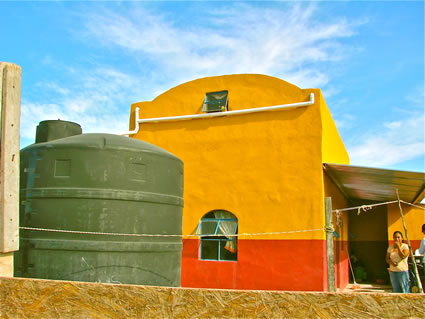 |
| New "Casita Linda" or "pretty little house"" |
A Responsible Volunteer Project Founded by Expatriates
I set out to research organizations in San Miguel de Allende, Mexico. My purpose was to select a small, authentic project helping Mexican families. Dozens of important organizations are available, but I chose Casita Linda or "pretty little house."
San Miguel is a famed town with many fine restaurants, art galleries, and shops. Nevertheless, just a few miles away, Mexican families live in extreme poverty. Most are single mothers with their children, struggling to survive.
In 2001, expatriates wanting to "change the destiny of poverty," decided to found Casita Linda. Since then, 60 families have found hope, warmth, and security in their new and brightly painted homes.
In December 2013, I visited "Ejido de Tirado," an isolated area on the fringe of San Miguel. The dirt access road is rutted and filled with potholes. Most families in this area were living in makeshift hovels made of a tarp, sticks, cardboard, or stones, providing little protection from the elements.
I imagine a mother and children, wet and cold, huddling together on a dirt floor in their shelter without electricity, running water, sewage system, or the most basic human necessities.
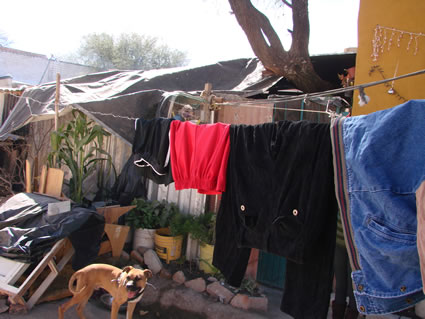 |
| Makeshift shelter before Casita Linda. |
A New Life in a Real Home
Now, families are eager to show off their new adobe brick home. Adobe is a unique material that keeps families cool in summer and warm in winter.
Inside, wooden steps lead to sleeping or storage spaces. Upstairs, comfortable mattresses made of recycled plastic are covered with a sturdy fabric. A ceiling skylight brightens each room.
Downstairs, the entry hall divides another sleeping space and kitchen area. Frilly curtains sometimes cover screen windows. Families now feel protection with a locked door. A NoKero, 2000 solar light bulb, provides light. It recharges in the morning with a battery that lasts 16 years.
Stepping out of the house, I noticed a low metal stove for cooking tortillas, a 55-gallon cistern, water basin, and a ceramic plaque with the family’s name and house number.
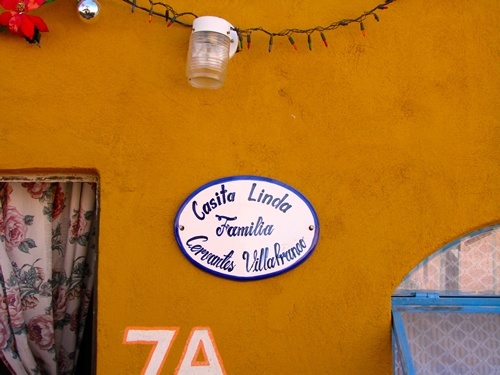 |
| Ceramic plaque with new house owner's name. |
I asked the family what it was like during rainy season, and told, “rain fell, everything was wet and muddy, flooding into our lean-to. Now everything is different. We still cannot believe the home is ours. We feel happy with our new casita.”
Parents added, ”Our children love not being cold. We all were saturated when it rained…our clothes and the ground. Now we are warm and dry and secure with a lock on the door. We feel proud and happy to live in our pretty little house with our family.”
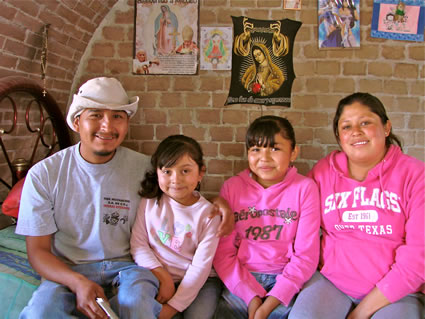 |
| The Ramirez family in their new home. |
How the Casita Linda Organization Works
Casita Linda partnered with the Rhode Island School of Design in 2008 to design and build a more environmentally sound and energy-efficient house. Initially, houses had a barrel-roof design, but now a flat roof design provides more space in the loft area and is faster to build.
Casita Linda employs two teams, one of four and one of five. They are well-paid Mexican construction workers, including two maestros or supervisors, a social worker, an outreach worker, two accountants, local and international volunteers, as well as members of the recipient family. Two houses are built each month.
.
Unlike Habitat for Humanity, Casita Linda outright gives the houses to impoverished Mexican families. They are too poor to obtain loans and have no way to repay them. Each family must provide the land, but this is generally not a hindrance.
After the Mexican revolution, in the early 20th century, haciendas were broken up into plots of land called "ejidos." The land has passed from generation to generation, however families never could afford to build a house on what it had inherited. Now, the family has the land, and Casita Linda builds a home on it.
Each family must be actively looking for work. They are expected to help with the building of their home, as well as those being constructed for neighbors before and afterwards, as much as possible. Their children must go to school. No alcohol, violence, or drugs are permitted.
Casita Linda chooses families greatest in need. The families are interviewed and selected by a team of volunteers, a social worker, and the board of directors. A construction timetable is then chosen. Volunteers are selected and local materials are purchased.
One of the workers, a grandfather, age 86, said, "I am building my house and I feel like 18 years old. I say prayers of thanks every night to Americans for our new home.”
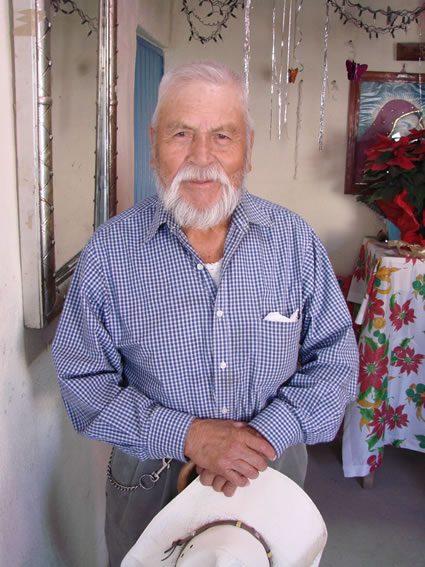 |
| A grandfather who helped build his new home. |
$7000 to $8500 is the approximate cost to build a home, including tax and labor. The size of each home ranges from a modest 380 to 500 square feet, depending upon the size of family. Houses accommodate up to eleven family members.
In order to pay for the houses, Casita Linda receives donations, grants, and sponsors annual fundraising events. Not until 2012 did Casita Linda finally received federal, state, and local monies through their Green Fund.
Volunteers are welcome, whether to assist with construction, social services, fund raising, or public relations.
One volunteer account refers to the "Fabulous Fargo Women." Each year, after fundraising, they return with $3,000 to $4,000. People share the story of a 13-year old boy who raised $30,000 by climbing Mt. Kilimanjaro.
If you are interested in learning more about volunteering or donating to the worthy cause, contact Casita Linda through their website.
Sandra Kennedy is a Freelance Travel Writer & Photographer based in Oregon. She is a member of the North American Travel Journalists Association and has contributed to many international and national publications. She specializes in South American travel.
|
